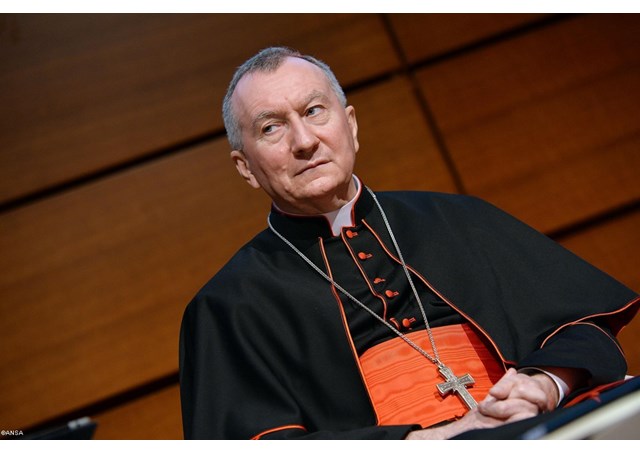
Cardinal Parolin: Prayer at centre of Peres-Abbas meeting on June 8

(Vatican Radio) The Holy See’s Secretary of State, Cardinal Pietro Parolin, said prayer will be at the centre of the June 8 meeting between Israeli President Shimon Peres and Palestinian President Mahmoud Abbas at the Vatican. Pope Francis invited the two leaders to the Vatican on May 25th, during his pilgrimage to the Holy Land.
Listen to our report:
“It is a meeting of prayer. The Pope has placed it in this perspective: Prayer is like a force for peace,” Cardinal Parolin said.
“Certainly, there will be a very powerful symbolic meaning in the fact that the Palestinian president and Israeli president will be there together,” he added. “But then there is an added value, the value of prayer: They will pray together. We hope that there, where human efforts have so far failed, the Lord offers to all the wisdom and fortitude to carry out a real peace plan, including building trust …and overcoming obstacles –which are … numerous and serious – which still prevent the achievement of peace in the Holy Land.”
Turning to Syria, the Secretary of State said a negotiated solution is possible if there is a political willingness.
“All interested parties therefore must be willing, and must cast aside the attitude that they can prevail by force of arms,” he told Vatican Radio.
The Cardinal said the Holy See is concerned the situation in Syria will become a “forgotten conflict,” and pointed out the Holy See, under both Benedict XVI and Francis, has tried to draw the attention of the international community, especially those with some influence in the region, to help achieve a negotiated solution to the crisis.
“It is the only way to find an answer to the conflict,” he said.
When asked about the humanitarian situation, especially the importance of keeping open humanitarian corridors, Cardinal Parolin stressed the urgency of the situation.
“This is a very important point because it is necessary that the entire population, regardless of religious affiliation or ethnic origin, has access to food and medical care,” he said.
Cardinal Parolin said the Holy See has consistently insisted on this one point: Humanitarian assistance must not be denied to anyone.
He also said Christians in Syria have a “great and difficult” task. Cardinal Parolin quoted the 2nd century Christian document, the Epistle to Diognetus, which reads: The Lord has put you in a difficult position of great responsibility, but you cannot abdicate this vocation.
“I believe that also the Christians in Syria cannot and should not [abdicate their responsibility], because they are part of the solution,” he said.
He added the Christian community “must be instruments of communion and rapprochement” among the different factions, encouraging dialogue and a negotiated settlement.
Cardinal Parolin concluded by speaking of those Christian clergymen who have been kidnapped during the hostilities, including Aleppo’s Greek Orthodox Archbishop Paul Yazigi and Syriac Orthodox Archbishop Yohanna Ibrahim, and Jesuit Father Paolo Dall'Oglio.
The Cardinal said the Holy See is concerned about them, and is awaiting news.
“Above all, we hope they will be set free,” he said.
| All the contents on this site are copyrighted ©. |


